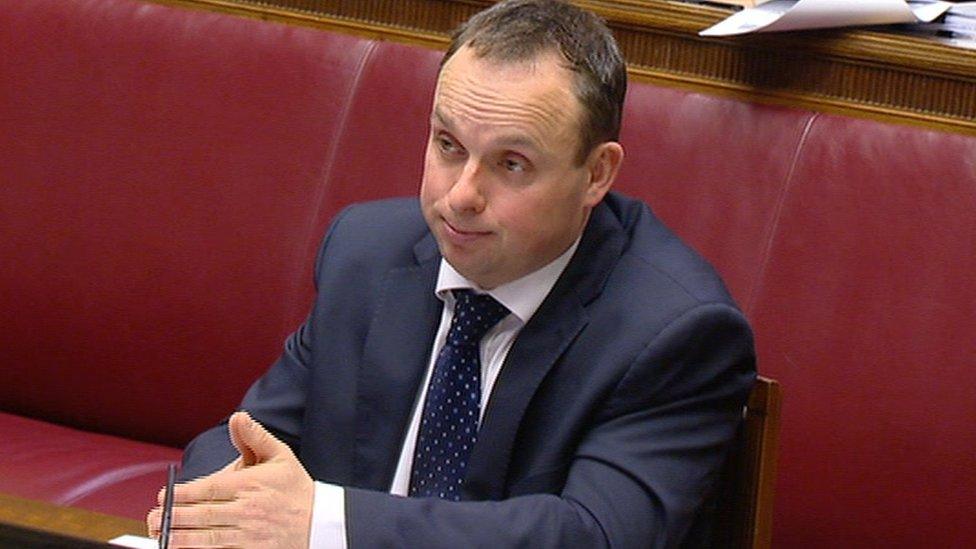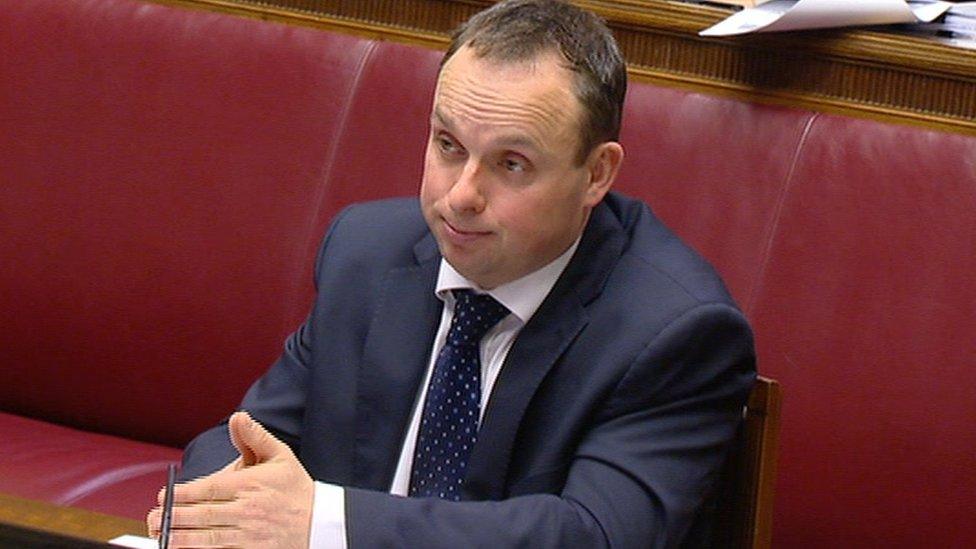Foster denies RHI scheme was to benefit DUP voters
- Published
Arlene Foster says RHI scheme beneficiaries are "not restricted to DUP supporters"
The Democratic Unionist Party leader has rejected suggestions that a flawed green energy scheme was meant to benefit supporters of her party.
Arlene Foster was giving evidence to the inquiry into the Renewable Heating Incentive (RHI) scheme.
Counsel to the inquiry David Scoffield QC said it was a view that might be taken by a "particularly cynical" section of the public.
RHI offered financial incentives if firms switched to renewables.
But the fuel actually cost far less than the subsidy they were receiving, effectively meaning that users could earn more money by burning more fuel.
The public inquiry into the scheme began in November 2017.
Mr Scoffield said the scheme had been heavily subscribed to by members of the farming community and Mrs Foster agreed that the DUP had strong support in that sector.
But she did not accept that the lucrative green energy scheme was directed at only one section of the community.
"I think if you look at recipients of the RHI scheme they are wide and varied and across all communities in Northern Ireland," she said.
"They certainly are not just restricted to supporters of the DUP."
Mrs Foster said she had not been aware of abuse of the scheme.
Inquiry chairman Sir Patrick Coghlin said he could understand why farmers, who often worked hard for modest incomes, would not have flagged up how lucrative it was.
Mrs Foster said that although she represented a rural constituency the high level of payments had never been raised with her.
She said it would have made no sense to tell someone who would have changed things.
Mrs Foster said she would not have wanted to have any association with a scheme which was over-compensating firms.
She said how RHI had worked out had been a "huge regret for me in my political life".
Earlier, Mrs Foster defended the continued employment of her ex-special adviser in a part-time role with the party.
Andrew Crawford twice sent confidential government documents relating to RHI to a cousin before they had been made public.
He later accepted his actions had been "inappropriate" and apologised.
Mr Crawford is still working for the DUP, carrying out Brexit research for the party's MEP Diane Dodds.
Mrs Foster was asked about his conduct when she appeared at the public inquiry into the Renewable Heat Incentive (RHI) energy scheme.
She said had she known it would have led to an internal departmental investigation and would have been considered by party officers.
'Not particularly serious'
She was asked about the possible outcome of the investigation and whether he would have been allowed to continue as her adviser.
She declined to be drawn, saying it was a "hypothetical" situation.
Counsel to the inquiry, David Scoffield QC, said the fact that he was still working for the DUP might lead some members of the public to conclude that "this hasn't been viewed as particularly serious by you or the party".
Mrs Foster said that while Dr Crawford's conduct had been "inappropriate and disappointing" she did not think that what had happened precluded him from having part-time work "forever and day".
"I'm quite sure that he has learned his lesson in relation to that, because of the way in which things transpired."

Mr Crawford was an advisor to Mrs Foster during the RHI scheme's design and implementation
Mr Crawford stepped down from his role in January 2017 as controversy over his role in the RHI affair escalated.
Mrs Foster said he had never sought the limelight but had been thrust into it.
'Outrageous'
Inquiry chairman Sir Patrick Coghlin said it was hardly surprising given what had happened.
Mrs Foster agreed but said some of the commentary around his resignation had been "outrageous".
The DUP leader accepted that a businesswoman who raised concerns with her over RHI was caught in the "political crossfire" as the furore over the scheme erupted.
She said Jeanette O'Hagan had been failed by officials after an email which ultimately led to her identification was released.
Mrs O'Hagan had been adamant that the email should not be put into the public domain.
But it was published as the DUP fought to deflect criticism over the role of Mrs Foster, the then First Minister, in the scheme.
Sir Patrick suggested one interpretation was that the businesswoman had been "fed to the wolves".
Mrs Foster said the DUP's understanding was that Mrs O'Hagan had been content for the email to be released.
'Lack of clarity'
Sir Patrick said the inquiry really needed to know "how that understanding had been formed".
Mrs Foster said she had not been party to those discussions.
The inquiry was told that departmental officials who had been in touch with Mrs O'Hagan now accepted that there had been a lack of clarity about what she had agreed to.
Mrs O'Hagan had sent three emails in August and September 2013.
One was sent to the Enterprise department.
The other two went directly to Mrs Foster's constituency email account.
The first made no direct reference to abuse of the RHI scheme
But the last one sent to Mrs Foster did refer to "misuse" of the scheme.
Mrs Foster sent the first one to her departmental officials and it led to a meeting.
But she appears to have deleted the others.
She said she had not picked up on the abuse claim and thought they were simply chasing emails seeking a response.
When allegations were broadcast that Mrs Foster had been contacted with concerns about abuse in the scheme, the claims were denied by the DUP.
They issued a statement by the party's deputy leader Nigel Dodds.
It referred to the first email and said it showed that Mrs Foster had not been told directly of the abuse claims.
He claimed it had been the only contact between Mrs O'Hagan and the minister.
The email was published with redaction.
But Mrs O'Hagan said it would have been easy for anyone in the industry to identify who had sent it.
Mrs Foster told the inquiry on Thursday that that had clearly been wrong.
She said her party press officers had been in a "scramble" to deal with a flood of media enquiries at the time.
"In the melee that happened at the time it's easy to see why these kind of misunderstandings can occur but it's not acceptable," Mrs Foster said.
The first email led to a meeting between Mrs O'Hagan and departmental officials.
At it she raised concerns about abuse of the RHI scheme but was not believed.
Mrs Foster said she never got a read out of that meeting, and was never told of subsequent emails sent by Mrs O'Hagan which highlighted further serious issues about RHI.
'No urgency'
The DUP leader also rejected a suggestion that she "essentially forgot" about proposed cost controls for the RHI scheme.
They were put forward in a consultation document in 2013, but more than a year later they still had not been introduced.
The inquiry was told that other issues relating to the renewable heat scheme had been prioritised.
Officials had decided to park the cost controls and instead concentrate on opening the RHI scheme to domestic homes.
Mrs Foster said she knew that, but officials were not warning her about the importance of introducing the budget control measures.
Mr Scoffield put it to her that she and her special adviser Mr Crawford "essentially forgot how significant the cost control proposals had been in the consultation document that had been provided in 2013".
Mrs Foster said the issue was clearly raised in the consultation document but after it closed it had not been raised with her as a "live issue".
"There was no urgency, no submissions being brought to me and therefore I don't think it was on our radar that had to be dealt with quickly - wrongly so as it turned out - but that's what happened at that time."
- Published17 April 2018

- Published7 November 2017
